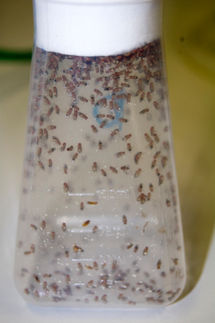Discovery of novel genes could unlock mystery of what makes us uniquely human
Advertisement
Humans and chimpanzees are genetically very similar, yet it is not difficult to identify the many ways in which we are clearly distinct from chimps. In a study published in Genome Research, scientists have made a crucial discovery of genes that have evolved in humans after branching off from other primates, opening new possibilities for understanding what makes us uniquely human.
The prevailing wisdom in the field of molecular evolution was that new genes could only evolve from duplicated or rearranged versions of preexisting genes. It seemed highly unlikely that evolutionary processes could produce a functional protein-coding gene from what was once inactive DNA.
However, recent evidence suggests that this phenomenon does in fact occur. Researchers have found genes that arose from non-coding DNA in flies, yeast, and primates. No such genes had been found to be unique to humans until now, and the discovery raises fascinating questions about how these genes might make us different from other primates.
In this work, David Knowles and Aoife McLysaght of the Smurfit Institute of Genetics at Trinity College Dublin undertook the painstaking task of finding protein-coding genes in the human genome that are absent from the chimp genome. Once they had performed a rigorous search and systematically ruled out false results, their list of candidate genes was trimmed down to just three. Then came the next challenge. “We needed to demonstrate that the DNA in human is really active as a gene,” said McLysaght.
The authors gathered evidence from other studies that these three genes are actively transcribed and translated into proteins, but furthermore, they needed to show that the corresponding DNA sequences in other primates are inactive. They found that these DNA sequences in several species of apes and monkeys contained differences that would likely disable a protein-coding gene, suggesting that these genes were inactive in the ancestral primate.
The authors also note that because of the strict set of filters employed, only about 20% of human genes were amenable to analysis. Therefore they estimate there may be approximately 18 human-specific genes that have arisen from non-coding DNA during human evolution.
This discovery of novel protein-coding genes in humans is a significant finding, but raises a bigger question: What are the proteins encoded by these genes doing? ”They are unlike any other human genes and have the potential to have a profound impact,” McLysaght noted. While these genes have not been characterized yet and their functions remain unknown, McLysaght added that it is tempting to speculate that human-specific genes are important for human-specific traits.
Original publication: Knowles DG, McLysaght A.; "Recent de novo origin of human protein-coding genes."; Genome Res 2009.


























































